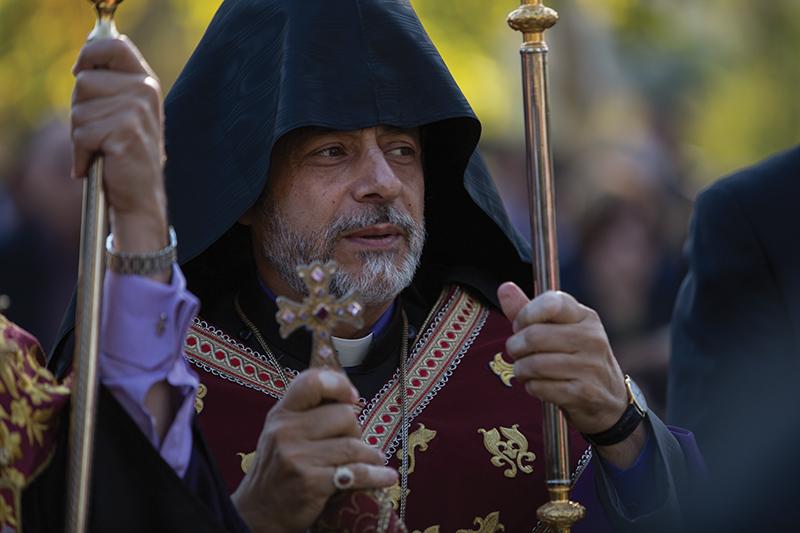
Leaders from the local Armenian community and the university broke ground on the Armenian Genocide Monument on Sunday, a project that hopes to commemorate and educate the public when it opens next April.
The monument will be located in Fresno State’s Maple Mall and will be christened on April 24, 2015, the 100th anniversary of the Armenian Genocide’s beginning.
The genocide was a systematic extermination of the minority Armenians from their homeland during 1915 to 1923 at the hands of the Ottoman Empire government. Historians believe as many as 1.5 million Armenians were killed by executions and mass death marches.
The main structure of the monument, which will be composed of bèton brut and tufa stones, will feature nine pillars that represent the six provinces of historic Armenia, the Armenian Kingdom of Cilicia, the diaspora of Armenians throughout the world and the Republic of Armenia as it is known today.
The monument’s leading architect, Paul Halajian, said the design would convey respect for the generation that experienced the genocide, as well as today’s generation that has “thrived” both as immigrants and in the Republic of Armenia.
Rather than focusing purely on the “negative aspects,” Halajian said the monument would also be a celebration. Above the pillars will be an incomplete halo, representing both the fracture left by the genocide and the unity of the Armenian people.
Halajian has been working on the design for a year with a subcommittee of the organization Armenian Genocide Centennial Committee — Fresno. The committee is comprised of local leaders in the Armenian community, including Fresno State Armenian studies professor Barlow Der Mugrdechian.
“To do this project on our campus, it was my dream that that would happen,” said Der Mugrdechian, whose grandparents survived the Armenian Genocide before immigrating to Fresno.
“This is very moving for me,” he said.
Also present at the ceremony, which drew a crowd of several hundred, was Levon Minasyan, a representative from the Consulate General of the Republic of Armenia in Los Angeles. He said the international recognition and condemnation of the genocide has been at the forefront of Armenia’s foreign policy priorities for almost two decades.
“The criminal must be punished. This is the only right way to go,” he said. “Having this in mind, the Republic of Armenia and the Armenian people stand as a strong advocate of peace and justice.
“The distortion of historical facts and the realities by Turkey cannot continue. We believe and hope that guilty consciousness will prevail in Turkey and the Turkish government will reconcile the reality of the Armenian Genocide. Crimes against Armenians and humanity, committed by its ancestors.”
The United States federal government has yet to formally recognize the Armenian Genocide, something Congressman Jim Costa, D-Fresno, said he hopes to change.
“I will always be the strongest advocate I can be on your behalf in our nation’s Congress, a member of the House of Representatives, to some day ensure, sooner rather than later, that the House of Representatives goes on record as recognizing the Armenian Genocide for all the right reasons,” Costa said at the ceremony.
As expressed by several speakers at the ceremony, the monument will serve as a way to educate the current and future community about this history.
“We are committed to education, That’s our primary mission, which is also at the core of the Armenian Genocide Monument,” Fresno State President Joseph Castro said. “This monument will inform and educate people about the Armenian Genocide and bring awareness to the problem of genocide throughout history.”
While other locations in the U.S. have Armenian Genocide monuments, Castro said this would be the first on any college or university campus in the country.
“We want this to be not only a symbol to commemorate the Armenian Genocide, but as a symbol of showing how Fresno State supports the recognition of the genocide and condemns genocides around the world,” said Marine Vardanyan, president of the Armenian Students Organization.
“Students are going to be passing by all the time. So they’re going to ask questions, they’re going to be curious,” she said. “So this will be a great way to stir up those discussions and get people talking about genocide as a global issue.”
The monument will be located in the most heavily-trafficked corridor on the university, said Cynthia Teniente-Matson, Fresno State vice president for administration and chief financial officer.
Soil from various historic locations in Armenia was traditionally blessed during the ceremony before being placed in a cylinder that would act as the center of the future monument.
“Our monument is intended to symbolize Armenians throughout the world,” Der Mugrdechian said.
In Fresno particularly, Armenians have “many roots,” said Vardanyan, who immigrated to Fresno with her family in 1999.
“That’s what I love about Fresno. We have those who actually came during the genocide, those that came earlier, those that came after and also then those that are coming now,” she said. “We have a mixture of all the different immigrants.”
“We’re Armenian-Americans, and we want to contribute to our own community,” Vardanyan added.





